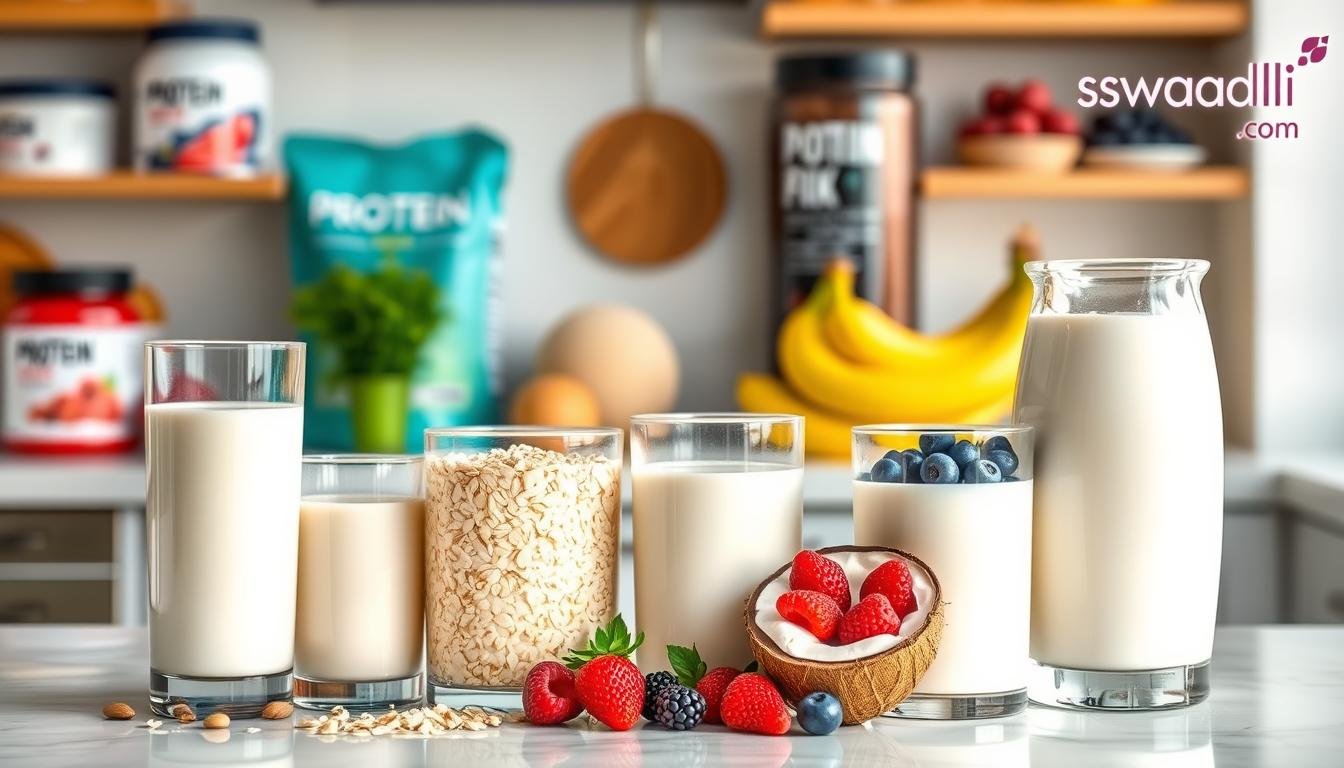Top Milk Choices for Protein Shakes: Imagine a post-workout routine that not only replenishes your energy but also helps you build lean muscle mass. The secret may lie in the milk you choose for your protein shakes. But with so many options available, how do you know which milk is the best for your fitness goals? In this comprehensive guide, we’ll explore the top milk choices for protein shakes, revealing the nutritional value, protein content, taste, and texture considerations that will help you make an informed decision.
Have you ever wondered if there’s a perfect milk for your protein shakes, or if the type of milk truly makes a difference in your muscle-building journey? The answer may surprise you, as the milk you choose can have a significant impact on the effectiveness of your protein shake. From classic cow’s milk to plant-based alternatives, we’ll dive into the pros and cons of each option, empowering you to select the best milk to support your fitness aspirations.
Top Milk Choices for Protein Shakes Key Takeaways
- Discover the top milk choices for protein shakes, including dairy and plant-based options.
- Understand the nutritional value and protein content of different milk varieties.
- Explore the taste and texture considerations that can enhance your protein shake experience.
- Learn about the benefits of whey and casein protein found in various milk sources.
- Discover lactose-free and plant-based milk alternatives suitable for protein shakes.
Exploring the Best Milk for Protein Shakes
Choosing the right milk is key for a great protein shake. You might like the taste of high protein milk or want to try other options. Knowing what each milk offers helps make a shake that’s good for you and tastes great.
Nutritional Value and Protein Content
Milk’s nutritional value is important when picking the best for your shake. Whole, low-fat, and organic milks have different amounts of protein and other nutrients. If you want more protein, choose high protein milk or alternatives like soy milk.
Taste and Texture Considerations
The taste and texture of milk also matter for your shake. Plant-based milks like almond and soy can make shakes creamy and rich. Low-fat milk makes shakes thinner. Flavored milks, like chocolate or vanilla, add a sweet touch.
| Milk Type | Protein (g/cup) | Fat (g/cup) | Calories (per cup) |
|---|---|---|---|
| Whole Milk | 8 | 7.9 | 149 |
| Low-Fat Milk | 8 | 2.4 | 122 |
| Soy Milk | 4 | 4.25 | 105 |
| Almond Milk | 1 | 2.5 | 30 |
Think about the nutritional value and taste of different milks. This way, you can make protein shakes that are good for you and taste amazing.
Cow’s Milk: A Classic Choice
Cow’s milk is a top pick for protein shakes. It’s full of protein, calcium, and other good stuff. We’ll look at whole milk vs. low-fat milk and the perks of organic and grass-fed cow’s milk.
Whole Milk vs. Low-Fat Milk
Whole milk is a classic for shakes, giving a creamy feel and lots of protein. Low-fat milk has fewer calories and fat but still packs a protein punch. Your choice depends on what you like and need.
Organic and Grass-Fed Options
Organic and grass-fed cow’s milk are great for those wanting more nutrients. They have more vitamins and minerals, like calcium. Plus, they’re better for animals and the planet.
| Milk Type | Protein Content (per cup) | Fat Content (per cup) | Calcium Content (per cup) |
|---|---|---|---|
| Whole Milk | 7.9 g | 7.9 g | 276 mg |
| Low-Fat Milk | 8 g | 2.4 g | 305 mg |
| Organic Milk | 8 g | 7.9 g | 276 mg |
| Grass-Fed Milk | 8.1 g | 7.9 g | 276 mg |
Choosing between whole, low-fat, organic, and grass-fed milk for shakes depends on you. Each has its own benefits, like protein, calcium, and healthy fats.
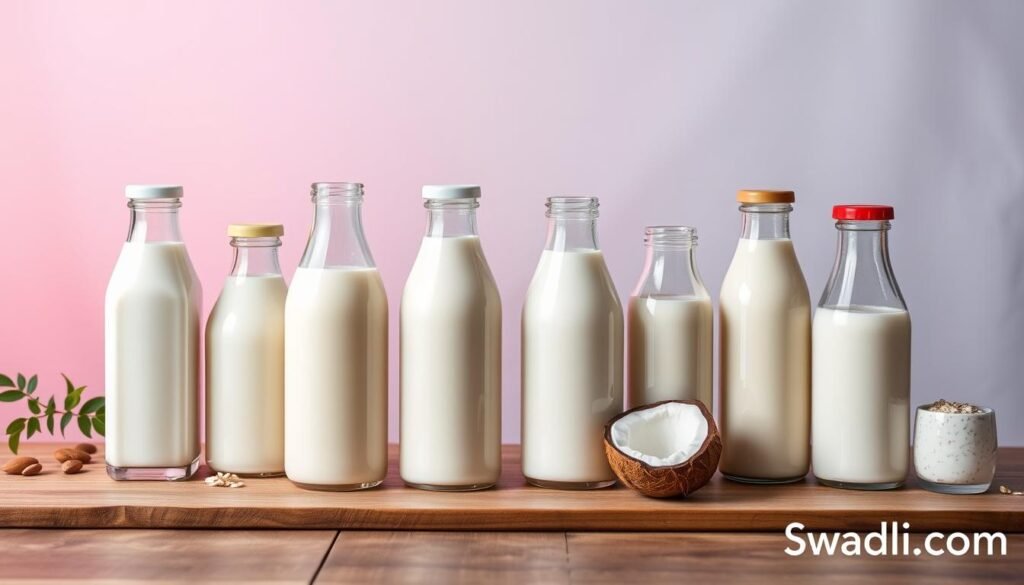
Whey Protein in Milk
Cow’s milk has two main proteins: whey and casein. Whey is special because it’s quickly absorbed. This makes it great for a quick protein boost.
Whey protein helps muscles recover and grow. After working out, muscles need amino acids fast. Whey protein gives them these nutrients quickly.
Whey protein is a complete protein. It has all the amino acids muscles need. This makes milk a good choice for protein shakes.
Whether you like organic milk brands, lactose-free milk options, or plant-based milk alternatives, whey protein is helpful. It supports your fitness goals and makes shakes more effective.
| Milk Type | Whey Protein Content (g per cup) |
|---|---|
| Whole Milk | 2.4 |
| Low-Fat Milk | 2.8 |
| Skim Milk | 3.1 |
| Soy Milk | 1.3 |
| Almond Milk | 0.4 |
See how different milk alternatives for shakes and protein-rich milk have different whey protein levels. This is key for making the best protein shake.
Casein Protein in Milk
Milk has more than just whey protein. It also has casein, a key protein. Whey is fast to absorb and helps muscles recover quickly. But casein is slow to digest, giving your body amino acids for hours.
Casein is great for your fitness goals. It’s different from whey because it turns into a gel in your stomach. This slows down how amino acids are released. It keeps your muscles building and gives you energy for hours after working out.
The Benefits of Casein Protein
- Slow-digesting protein that provides a steady stream of amino acids
- Helps maintain muscle protein synthesis for longer periods
- Supports muscle recovery and growth, especially when combined with whey-friendly milk choices
- Contributes to a feeling of fullness and satiety, which can be beneficial for those seeking to build or maintain lean muscle mass
Using both whey and casein proteins in your shakes is smart. You get a quick amino acid boost from whey. Then, casein’s slow release keeps your muscles going for hours. This mix is perfect for athletes and anyone wanting to build muscle with milk.

Lactose-Free Milk Alternatives
For those who can’t have lactose or don’t like dairy, there are many milk alternatives. These options have different nutrients and fit many diets.
Almond Milk
Almond milk is a favorite for those who want something dairy-free and low-calorie. It has little protein but adds a creamy texture and nutty taste to shakes. It’s great for those cutting down on low-fat milk for shakes or organic milk for protein.
Soy Milk
Soy milk is a plant-based milk full of muscle-building milk and calcium-rich milk. It has a lot of protein, making it perfect for shakes. You can find soy milk in many flavors, making shakes more fun.
Oat Milk
Oat milk is a new favorite for those avoiding dairy. It’s creamy and has a mild, sweet taste that goes well with shakes. It’s low in low-fat milk for shakes and organic milk for protein, making it a good choice for those looking for a lactose-free option.
Coconut Milk
Coconut milk is a creamy, lactose-free milk alternative that adds a tropical flavor to shakes. It’s low in protein but high in healthy fats, making shakes smooth and indulgent.
| Milk Alternative | Protein Content | Calories | Fat | Carbohydrates |
|---|---|---|---|---|
| Almond Milk | 1g | 30-60 cal | 2.5g | 1g |
| Soy Milk | 4-8g | 80-110 cal | 4-5g | 4-6g |
| Oat Milk | 3g | 120 cal | 5g | 16g |
| Coconut Milk | 0g | 45-50 cal | 4.5g | 1g |
When picking a lactose-free milk for your shakes, think about what you need and like. Soy and oat milk have a lot of protein. Almond and coconut milk are creamy and taste different.
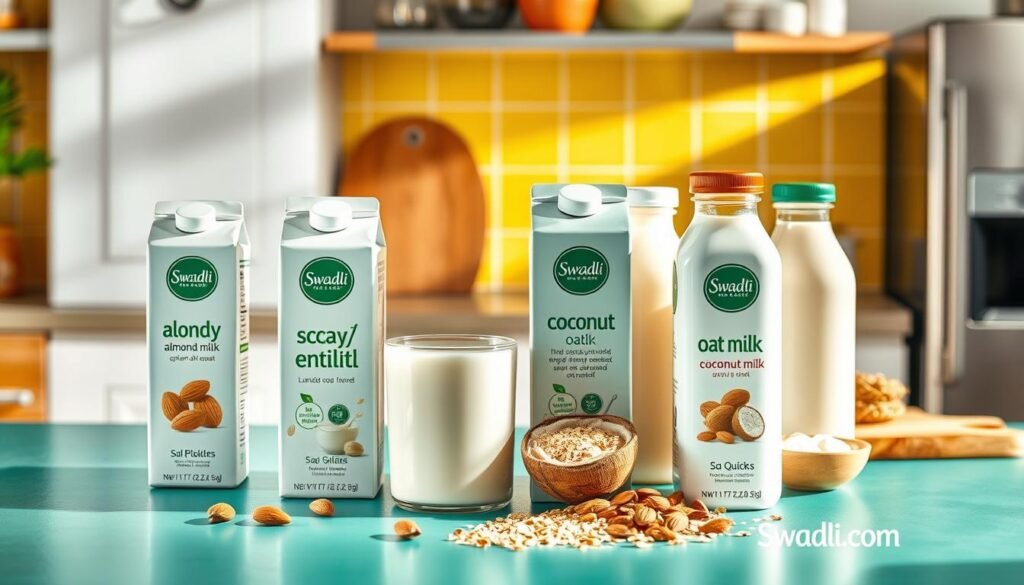
Plant-Based Milk for Protein Shakes
Cow’s milk is still popular for protein shakes. But, plant-based milk alternatives are getting more attention. They come in many types and meet different dietary needs. Let’s look at two main types for your protein shakes.
Soy Milk: A Protein-Packed Option
Soy milk is rich in protein. It’s made from soybeans and has lots of good protein. It also has vitamins and minerals like calcium, which is good for your bones.
Almond Milk: Low in Protein but Versatile
Almond milk has less protein but is creamy and tasty. It’s great for adding to protein shakes because of its smooth texture. It’s also good for those who want a non-dairy option.
Choosing plant-based milk for your shakes depends on what you need. Soy milk is best for more protein. Almond milk is good for those who want something creamy and low in calories. Pick what fits your taste and health goals.
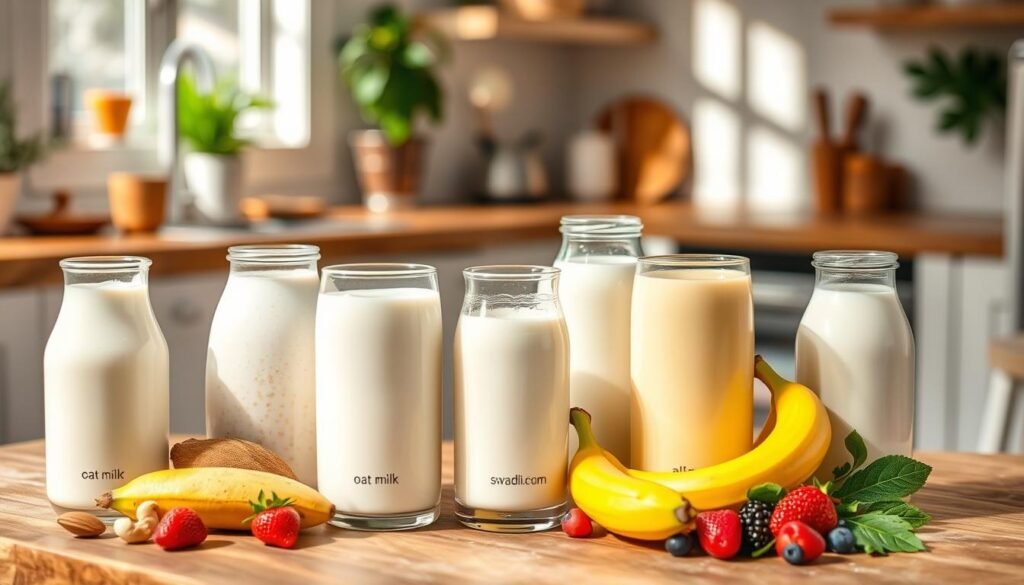
Milk Fat Percentage and Protein Shake Consistency
Choosing the right milk is key to a great protein shake. The fat in milk affects the shake’s texture. It makes the shake creamy and rich.
Whole milk makes shakes thick and indulgent. Its fat content makes them feel velvety. Low-fat milk, on the other hand, makes shakes lighter and watery.
For a balance, try 2% reduced-fat milk. It’s creamy but not too high in calories. It’s a good choice for those who want a smooth shake.
What milk you choose depends on what you like. Do you want a thick, creamy shake or a lighter one? There are many options to try.
| Milk Fat Percentage | Protein Shake Consistency |
|---|---|
| Whole Milk (3.25% fat) | Thick, creamy, and indulgent |
| 2% Reduced-Fat Milk | Balanced, smooth, and satisfying |
| Skim/Non-Fat Milk | Thin, watery, and less substantial |
Knowing how milk fat affects shakes helps you pick the right one. You can choose a creamy treat or a lighter shake.
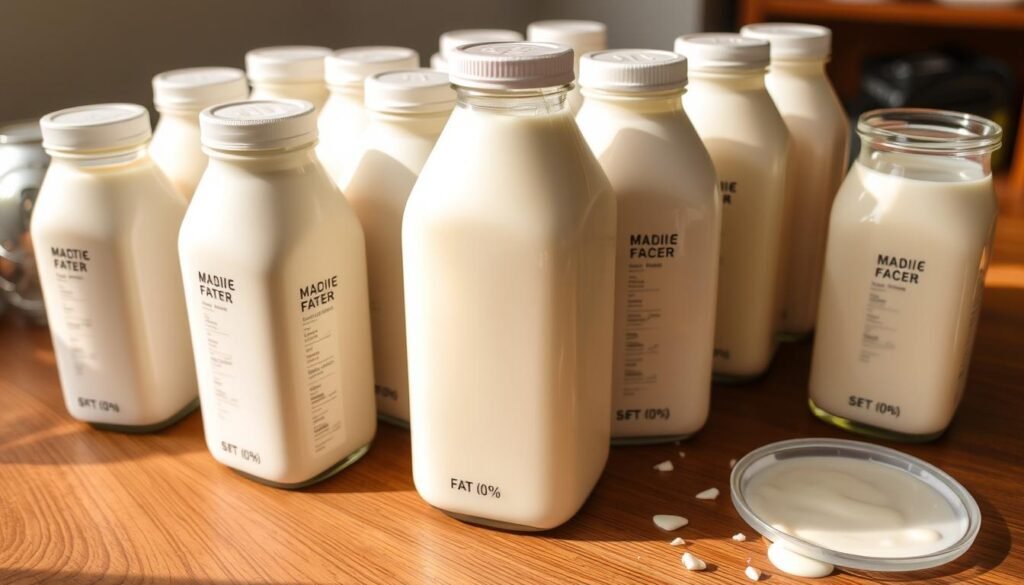
Best Milk for Protein Shakes
Choosing the right milk is key for a great protein shake. We’ve learned a lot from earlier sections. Let’s find the best milk for your shakes.
Cow’s milk, whole or low-fat, is a top pick. Organic and grass-fed milk adds more nutrients. It has whey and casein proteins for muscle recovery and growth.
Want a lactose-free option? Try lactose-free milk or milk alternatives like soy, almond, and cashew milk. Soy milk is high in protein. Almond milk adds creaminess and versatility.
| Milk Type | Protein Content | Nutritional Benefits | Texture |
|---|---|---|---|
| Whole Cow’s Milk | 8g per cup | High in whey and casein proteins, vitamins, and minerals | Creamy and rich |
| Soy Milk | 4-8g per cup | Plant-based protein, low in saturated fat | Smooth and creamy |
| Almond Milk | 1-2g per cup | Low in calories, high in vitamin E | Light and refreshing |
The fat in your milk affects your shake’s texture. Whole milk or high-fat milk alternatives make shakes thick and creamy. Low-fat options make shakes thinner and more fluid.
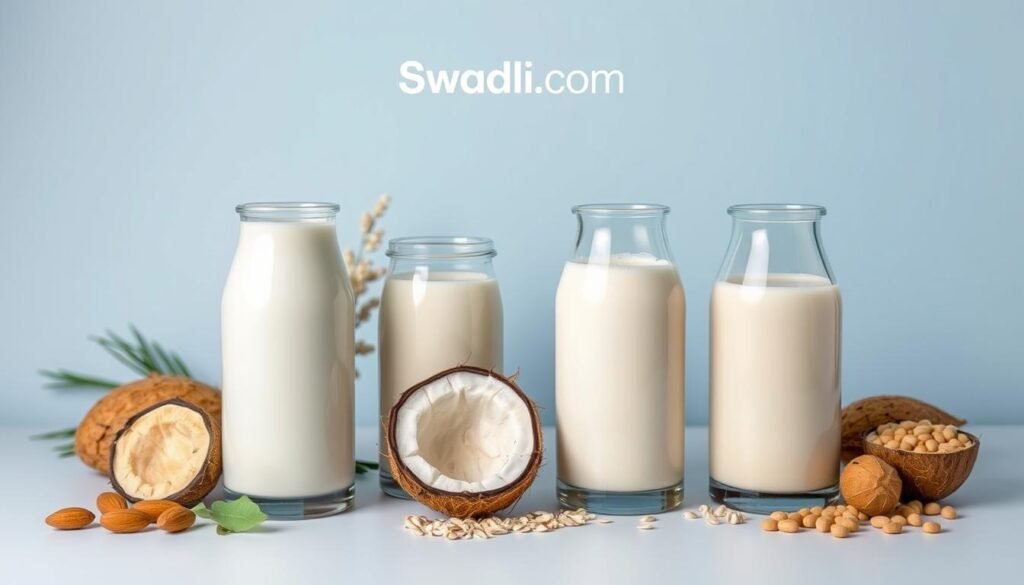
The best milk for you depends on what you like and need. Try different milks to find the perfect mix of protein, taste, and texture for your fitness goals.
Milk Powder: A Convenient Option
Milk powder is great for protein shakes. It’s packed with protein and other important nutrients. It’s easy to use and adds a lot of value to your shakes.
Whey Protein Powder vs. Milk Powder
Milk powder is different from whey protein powder. It has both casein and whey proteins. This mix gives you energy and helps your muscles recover.
| Nutrient | Whey Protein Powder | Milk Powder |
|---|---|---|
| Protein Content | 22-25g per serving | 26-28g per serving |
| Calcium | Negligible | 300-400mg per serving |
| Vitamin D | Negligible | 2-3μg per serving |
| Convenience | Easy to mix and store | Portable and shelf-stable |
Milk powder is full of protein, calcium, and vitamin D. It’s perfect for a balanced shake. Plus, it’s easy to carry and lasts a long time.

“Milk powder can be a game-changer for those looking to enhance the nutritional profile of their protein shakes without sacrificing convenience.”
Low-Fat Milk for Muscle Building
Building muscle needs the right food. Low-fat milk is a great choice for protein shakes. It has high-quality protein, important nutrients, and a creamy feel. This helps those who want to build muscle.
Milk, low-fat or whole, is full of high-quality protein. It has whey and casein proteins. Whey is fast to use, and casein is slow. Both help muscles grow.
Low-fat milk is good for building lean muscle. It has lots of protein but fewer calories and fat than whole milk. This makes it perfect for those watching their calories but still want milk’s benefits.
| Nutrient | Low-Fat Milk (1 cup) | Whole Milk (1 cup) |
|---|---|---|
| Calories | 122 | 149 |
| Protein | 12g | 8g |
| Fat | 2.4g | 7.9g |
Low-fat milk is great in a diet and workout plan. It has proteins, nutrients, and is low in fat. This makes it a smart choice for those building muscle.
Organic Milk: A Nutritious Choice
Choosing the right milk for protein shakes is key. Organic milk is a great pick. It’s packed with nutrients for your shakes.
Organic milk doesn’t have synthetic hormones or pesticides. It has more omega-3s and antioxidants. These help your shake be healthier and more nutritious.
| Nutrient | Organic Milk | Conventional Milk |
|---|---|---|
| Omega-3 Fatty Acids | Higher | Lower |
| Antioxidants | Higher | Lower |
| Protein | Similar | Similar |
| Calcium | Similar | Similar |
Organic and regular milk have similar protein. But organic milk has more nutrients. This makes your shakes better for your health.
“Organic milk is a great choice for those looking to maximize the nutritional value of their protein shakes.”
Organic milk is good for anyone who loves protein shakes. It makes your shakes healthier. This supports your overall health.
Flavored Milk for Added Taste
Plain high-protein milk is great for protein shakes. But, flavored milk like chocolate and vanilla can make them taste better. This makes your post-workout drinks more fun and tasty.
Chocolate Milk for Protein Shakes
Chocolate milk is a favorite for protein shakes. It mixes protein with cocoa’s rich taste. This makes your shake smooth and sweet.
Chocolate milk also gives you quick energy. This helps your muscles recover after working out.
Vanilla and Other Flavored Milk Varieties
- Vanilla milk: It has a warm flavor that goes well with many protein shake recipes.
- Strawberry milk: It adds natural sweetness and color to your shakes.
- Caramel milk: It gives your shake a rich, indulgent taste.
Using these flavored milks in your shakes makes fitness fun. You’ll look forward to your tasty, healthy drinks after working out.
Calcium-Rich Milk Sources
Milk is full of calcium, which is key for strong bones and health. When picking milk for shakes, look at the calcium to meet your needs.
Whole milk and low-fat milk have lots of calcium, about 300 mg per cup. Organic milk also has a lot, sometimes more than 300 mg per serving. For plant-based options, soy milk and almond milk have 300-400 mg of calcium per cup.
| Milk Type | Calcium Content (per cup) |
|---|---|
| Whole Milk | 300 mg |
| Low-Fat Milk | 300 mg |
| Organic Milk | 300-350 mg |
| Soy Milk | 300-400 mg |
| Almond Milk | 370-400 mg |
Adding these calcium-rich milk options to your shakes boosts protein and bone health. It’s good for your overall health too.
Muscle-Building Milk Beverages
Milk-based drinks are great for building muscles and helping them recover. They mix proteins, carbs, and nutrients well. This mix helps your fitness journey.
Post-Workout Recovery Drinks
Drinking a protein-rich milk after working out helps muscles fix and grow back. Milk has whey and casein proteins. These proteins give amino acids to muscles fast and keep making proteins.
Lean Muscle Mass Support
Milk also helps build muscles every day. High-protein milks and soy milk give the nutrients you need. You can choose low-fat or organic milk for your diet.
| Milk Type | Protein Content (per 8oz) | Benefits for Muscle Building |
|---|---|---|
| Whole Milk | 8g | Provides a balance of whey and casein proteins for recovery and muscle support |
| Low-Fat Milk | 8g | Offers protein with less fat for those focused on muscle building |
| Soy Milk | 4-8g | A plant-based protein-rich milk alternative for muscle-building |
Adding these milk drinks to your fitness plan helps build muscles. It also boosts your health and wellbeing.
Exploring milk options for protein shakes shows there’s no single best choice. The right milk depends on what you like, your diet, and fitness goals. You might choose cow’s milk, lactose-free, or plant-based options. The goal is to find milk that’s good for you and tastes great.
We talked about whey and casein proteins in milk. We also looked at milk fat and how to make shakes easy with milk powder. There are many milk choices, like soy and almond milk, for those with special diets.
Finding the best milk for your shakes means it fits your needs and helps you reach your fitness goals. It could be for building muscle, recovery, or just enjoying a tasty drink. Knowing what to look for helps you pick the perfect milk for your shakes.
Read More Like This: Click here
Read This Also: Benefits of Drinking Organic Milk
Top Milk Choices for Protein Shakes FAQ
What are the best milk options for protein shakes?
Good milk options for protein shakes are whole milk, low-fat milk, and organic milk. You can also try almond milk and soy milk. Choose based on what you need and like.
How much protein does milk contain?
Cow’s milk has about 8 grams of protein per cup. This includes whey and casein proteins. The protein amount can change a bit based on the milk’s fat content.
What is the role of whey protein in milk?
Whey protein in milk helps muscles recover and grow fast. It’s great for shakes after working out because it’s quickly used by the body.
How does casein protein in milk differ from whey?
Casein protein in milk takes longer to digest. It gives energy for a longer time and helps muscles recover slowly. It works well with whey protein, making milk a good choice for shakes.
Are there lactose-free milk options for protein shakes?
Yes, you can use almond milk, soy milk, and oat milk for shakes. They are good for those who can’t have lactose. They offer protein without dairy.
What are the benefits of using plant-based milk for protein shakes?
Plant-based milks like soy and almond milk are great for shakes. They are good for vegans and vegetarians. They have protein, but less than dairy milk.
How does the milk fat percentage affect protein shake consistency?
Milk fat affects shake texture. Whole milk makes shakes thicker and creamier. Low-fat milk makes them thinner and more watery.

